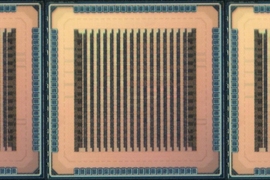Peter Shor, the Morss Professor of Applied Mathematics at MIT, has received the 2018 Micius Quantum Prize, which is awarded within the field of quantum computation.
Shor was nominated for his groundbreaking theoretical work on the factoring algorithm and quantum error correction. Shor, who received his PhD in applied mathematics from MIT in 1985 under the direction of Tom Leighton, is known for his work on quantum computation. Shor's algorithm is a groundbreaking integer-factoring algorithm that he developed in the mid-1990s, which proves a quantum computer can calculate the prime factors of a large number exponentially faster than a classical computer.
“Peter Shor's quantum algorithms, starting from his factoring algorithm — known as Shor's algorithm — has revolutionized the field of quantum computing,” says Michel Goemans, department head and professor of mathematics. “One could even say that the field would never have taken off without his deep and significant contributions to it.”
The algorithm is designed to use a quantum computer to quickly break through the RSA (Rivest-Shamir-Adelman) encryption algorithm, which is based on the difficulty of prime factorization, a major concern for the security of classical computing systems. Shor also introduced quantum error-correcting codes and fault-tolerant quantum computation to protect quantum states against decoherence and noise.
He will receive 1 million Chinese yuan (about $150,000) as part of his award, which he expects to put toward his continued research into quantum cryptography and quantum information theory. One idea: “I’m thinking about how quantum information relates to black holes,” he says.
More importantly, says Shor, the Micius Quantum Prize “will draw a lot of attention to the field.”
“It’s an exciting time,” he says. “The U.S. government and the Chinese government are putting a lot of money into quantum computing. Experimentalists are starting to build quantum computers that are reaching the point where they can’t be simulated by digital computers. People are building very small prototypes, as experiments to see how big quantum computers will behave.”
Shor has received many other awards for his quantum computing research, including the Dirac Medal of the International Centre for Theoretical Physics, the IEEE Eric E. Sumner Award, for Outstanding Contributions to Communications Technology, and the Nevanlinna Prize. He also is affiliated with the Computer Science and Artificial Intelligence Laboratory (CSAIL) and the Center for Theoretical Physics.
The Micius Quantum Prize recognizes significant science advances ranging from early conceptual contributions to recent experimental breakthroughs in the field of quantum communications, quantum simulation, quantum computation, and quantum metrology. Funded by private entrepreneurs, the Micius Quantum Foundation was named after the fifth-century B.C. Chinese scientist — who is also known as Mozi — who used a pinhole to discover that light travels in straight lines, and who wrote an earlier version of what later became Newton’s first law of motion.
The newly announced 2018 and 2019 laureates represent the inaugural winners of the Micius Quantum Prize. Other 2018 Micius laureates are Juan Ignacio Cirac, David Deutsch, and Peter Zoller, for their theoretical work on quantum algorithms and physical architectures of quantum computers and simulators; and Rainer Blatt and David Wineland, for experiments that demonstrated fundamental elements of quantum computing with trapped ions.
The 2019 Micius Quantum Prizes were announced within the field of quantum communication: Charles Bennett, Gilles Brassard, Artur Ekert, and Stephen Wiesner, for their inventions of quantum cryptography, and Jian-Wei Pan and Anton Zeilinger for experiments that enabled practically secure and large-scale quantum communications.
The award ceremony for 2018 and 2019 prizes will be held on Sept. 20, during the International Conference on Emerging Quantum Technologies in Hefei, China.










